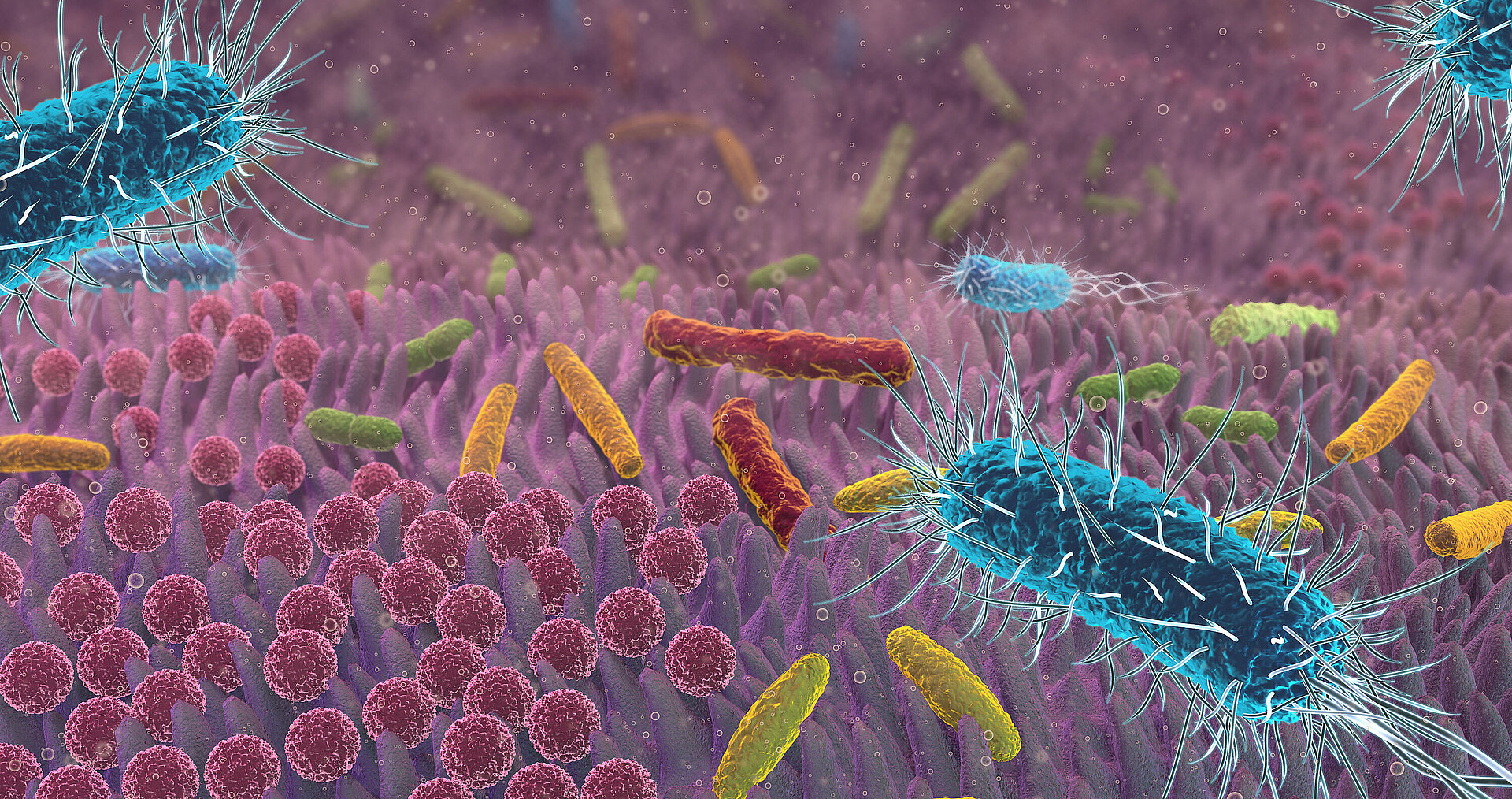Welcome to the Research Department of the Institute of Medical Microbiology and Hospital Hygiene at the HHU
The Institute of Medical Microbiology and Hospital Hygiene is dedicated to the research and diagnosis of infectious diseases caused by bacteria, parasites, and fungi and their immunologic defense.
The research activities of the members of the Institute focus on host-pathogen interactions and immunity to pathogens to unravel fundamental mechanisms of host defense. A central element of this research is the identification and characterization of immune effectors of the innate and acquired immune system, the elucidation of the roles of proinflammatory cytokines, especially interferons and tumor necrosis factors in infectious diseases. Other focus areas are genomic microbiology / microbiome research, antimicrobial resistance against antibiotics as well as the investigation of virulence mechanisms of selected pathogens. In addition to basic research, research also is directed towards the documentation and analysis of nosocomial infection chains employing molecular epidemiology and bioinformatics approaches. Also, the development of molecular and next generation sequencing assays as tools for the advancement of molecular microbial diagnostics is constantly being pursued. Recently, real time sequencing for SARS-CoV-2 was implemented in cooperation with the Institute of Virology and local health authorities (covgen.hhu.de).
Scientists of the institute are members of research consortia such as the CRC 1208 “Identity and Dynamics of Membrane Systems”, the Manchot Graduate School “Molecules of Infections”, the RTG 1949 “Immune Response in Infectious Diseases”, the RTG 2158 “Natural products and natural product analogs against therapy-resistant tumors and microorganisms”, the Manchot Research Group “Decision-making with the help of Artificial Intelligence”, DeCOI (German COVID-19 OMICS Initiative) and NUM (Netzwerk Universitätsmedizin (COVID19)).
Research Groups

The Pfeffer research team deciphers host-pathogen interactions in model systems and at the cellular and molecular level. It characterizes cytokines that regulate the immune response and identifies immunological effector mechanisms that protect from or control invading microorganisms. In addition, the team conducts microbiome research.

The work of the Scheu research team focuses on cytokine-producing cells of the immune system and their function in the immune defense against viral, bacterial and eukaryotic pathogens and in the development of autoimmune diseases. Our focus is on dendritic cells (DCs), the professional antigen-presenting cells, and on the cytokine family of type I interferons, which play a key role at the interface between innate and adaptive immune responses in combating viral infections and in the pathogenesis of neuroinflammatory diseases such as multiple sclerosis. Using sensitive reporter models, we visualize type I interferon-producing cells, especially plasmacytoid DCs, in vivo and identify molecular regulatory mechanisms of their differentiation and effector functions.

The Dilthey research team works at the interface between new sequencing technologies, bioinformatics and statistical modeling, and applications in diagnostics and basic research. Our research contributes to harnessing the tremendous technological advances in genome sequencing technology for the generation of biomedical knowledge. Current research focuses on microbiome research, immunogenetics in the largest human genome cohorts, the development of new DNA-based diagnostics for sepsis, and the development of new algorithms and bioinformatics methods. Since the onset of the SARS-CoV-2 pandemic, we have been developing new systems for genomic surveillance and infection chain analysis in populations in collaboration with local and national partners.

The Henrich research team characterises the pathophysiological processes of the facultative pathogenic urogenital pathogen Mycoplasma hominis at the cellular and molecular level. We use this heterogeneous, genome-minimised bacterium as a model organism to study basal processes of a pathogen. To this end, we decode the genomes of clinical isolates using whole genome sequencing, identify virulence factors, defence islands and mobile genetic elements and analyse their differential expression in the host cell model. In cooperation with working groups of this institute and various other departments at the UKD, we characterise oral and intestinal microbiomes either by quantifying selected marker bacteria or by metagenomic analyses.

The MacKenzie research team is studying toxogenic Clostridium difficile with respect to the possible different strain-specific potential for toxin production in various strains and their relationship to the severity of clinical Clostridium difficile-associated disease (CDAD). We are currently exploring the role of tcdC mutations in vitro and its clinical correlate in patients suffering from CDAD. In addition we are embarking on a project to document the epidemiology of CDAD in the greater Düsseldorf area using advanced typing and sequencing techniques.
A second avenue of research is, together with Birgit Henrich the development of new molecular methods of detecting agents of infectious diseases in clinical specimens and also using these methods to provide timely information concerning virulence or antibiotic resistance. Our group is also interested in the resistance mechanisms of Pseudomonas aeruginosa and Enterobacter spp. in particular with the respect to the prevalence and mobility of metallo beta-lactamase carbapenemases in these pathogens.
The Finzer research group is concerned with the role of the human microbiome in the development of diseases. In cooperation with the Dilthey group, we are investigating changes in the microbial colonisation pattern ("dysbiosis") in the oral cavity and genital tract that are associated with systemic and local diseases: Changes in the oral microbiome in the development of Alzheimer's disease or oropharyngeal carcinoma and changes in the genital microbiome in the development of bacterial vaginosis. In addition, we develop cell-based model systems in the laboratory that map the interactions of microorganism and host and thus provide experimental access to the medical role of the microbiome.


